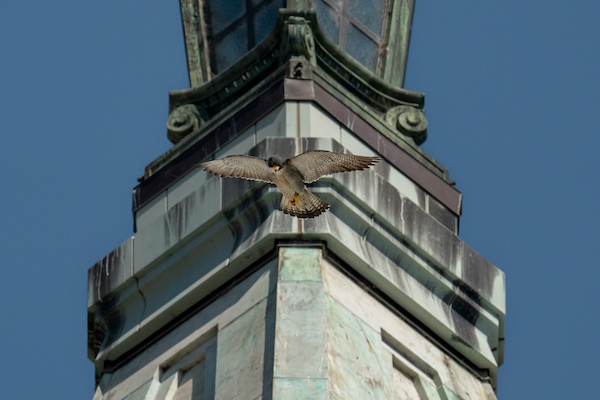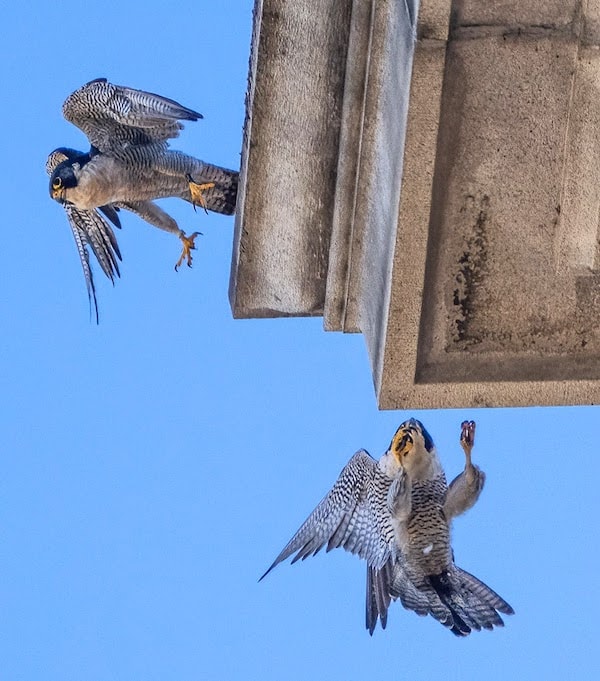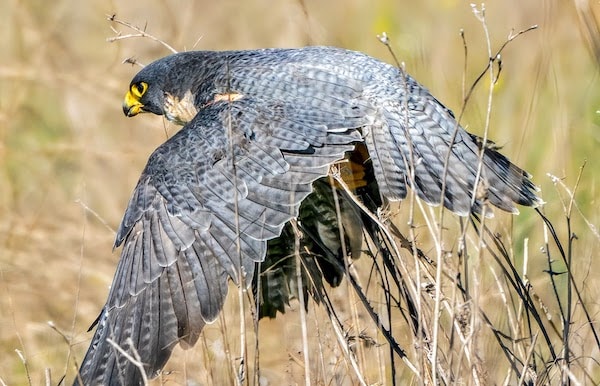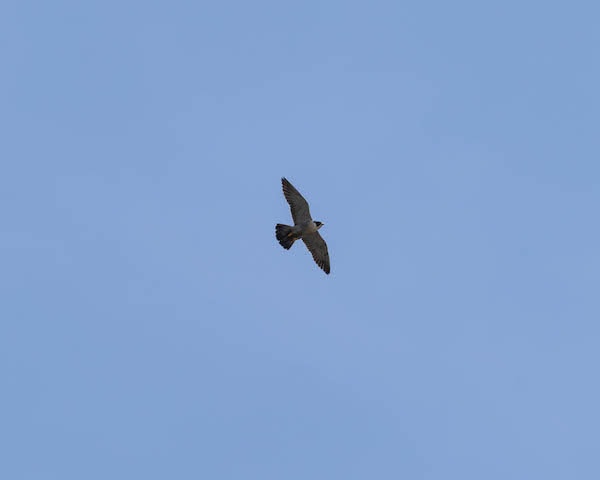Annie + Grinnell 4EVA
By Megan Fradley-Smith
The morning of March 31 dawned with sweet promise.: Annie, one half of the famous Cal Falcons, was due to lay her much-anticipated third egg. After a nesting season full of violence, injury, and love triangles, her adoring fans were ready to finally breathe easy. I was up early, coffee in hand, video of the Campanile tower streaming on my laptop. There was much more action that I anticipated: a juvenile female hopped into the nest during one of Annie’s absences, checking out the eggs while we, surrogate human parents, watched in rapt horror. Annie and Grinnell both were seen battling encroaching falcons, displaying the daring aerial combat for which Peregrines are known. Mercifully, by midday, Annie was back, serenely resting on her eggs. I decided it was safe for me to take a quick break from my monitoring, and ran a few errands. In that hour, the world of the Cal Falcons was forever changed.

Tragedy struck. In a shocking turn of events, Grinnell, beloved patriarch of the Cal Falcons, was found dead in downtown Berkeley. I read this news with a slack jaw and aching heart, aghast. After so many ups and downs, after receiving expert care from Lindsay Wildlife in October, after the presumed death-then-return of Annie, Grinnell was gone, just like that. Comments poured in on the social media channels of the Cal Falcons, run by ornithologist couple Lynn Schofield and Sean Peterson. Collective grief was palpable, and we grappled with yet another blow, not only to our cherished Peregrine couple, but to all of us who followed them. I had personally set out to write a charming essay about these two love birds, culminating in a grand point about how their resilience could bolster our own, so faltering after these pandemic years. Instead, I am here to write the memorial of an incredible Peregrine Falcon called Grinnell, ambassador of his species and father to five successful broods.
Grinnell was born sometime in 2013, around Martinez, California. He and his brother were banded by the Santa Cruz Predatory Bird Research Group as fledglings, and his black bands became his signature look, easily distinguishable from other falcons. He and Annie were first seen on the UC campus in late 2016, as they scoped out and ultimately chose the Campanile as their nest site. Their first attempt at parenthood was precarious, as they chose a decrepit sandbag as their nest scrape. After at least 2 eggs fell off this haphazard spot, the scientists were able to offer an assist in the form of a gravel nest box. Over their first years together, Annie and Grinnell raised two broods of chicks, who were banded and have been spotted sporadically in recent years. With crowdfunding and community support, the Cal Falcons team was able to install the three nest cams now in the tower, which have become a world-renowned viewing experience. Three more broods were laid, hatched, and fledged while an increasingly interested public tuned into the daily streams. To be so close to these mighty raptors in their tenderest, most vulnerable moments was priceless.

As COVID came crashing down on all of us, the 2020 nesting season became something of a viral sensation. Not only were locals keeping tabs on these fan favorites—now, hundreds of people from all over the globe were starting to be drawn in to Annie and Grinnell’s precocious crew. If living through a communal tragedy like the pandemic united us somehow, then seeing these beautiful, powerful creatures soar while we were confined brought us a shared catharsis. The 2021 nesting season was just as eagerly watched, and the support of a growing viewership has permitted the scientists behind the social media channels to enact real change. Even a cursory scan of the thousands of comments throughout their platforms finds earnest citizens learning facts about Peregrines from expert biologists, and moreover, an electric enthusiasm for this species. This is remarkable and much needed, as Peregrine Falcons, like many other raptors, have only recently been brought back from the brink of extinction by tireless recovery efforts. Annie and Grinnell, and their delightfully awkward offspring, may very well be inspiring the next generation of conservationists and lawmakers.

So it was like a wave of grief cascading over the dedicated fans of Grinnell to hear of his shocking demise. That such a loyal and tenacious animal had met such an ignoble end was inconceivable, something worse than heartbreaking. As the day went on, I could not bring myself to watch the nest cams, my brain dwelling on Grinnell’s last disoriented moments, my stomach churning, relentlessly. Even clicking on the nest cam for a moment, hearing Annie’s calls—my heart could not take it. I untethered myself from my screens entirely, and went for a walk, sorrow heavy on my shoulders.
Amazingly, Annie and her eggs are hanging on, and the future of the nest, though still uncertain, no longer looks grim. Since Friday, a new male Peregrine has stepped in, and by the looks of it, may very well be Annie’s chosen mate for the rest of this nesting season. They have engaged in courtship behaviors, copulation, and most encouraging of all: Annie has laid a third egg. It has been suggested that this may actually be her fourth egg, and it may even be fathered by the new male (currently referred to as “ New Guy”). For now, the fact that another male has been accepted by Annie, and has been taking his turn incubating the eggs, is a tiny, desperately needed ray of hope.

I visited the Campanile on Saturday afternoon, to pay my respects to Grinnell’s memorial and experience the site for the first time. The day was full of action, almost immediately: the screams of falcons rained overhead as New Guy battled two intruders, and later Annie herself zoomed out to warn off a wayward Red-sShouldered Hawk. It was exhilarating to be so focused on these exceptional birds, to have every available sense at attention, ready to observe a Peregrine Falcon take flight. Every now and then, another person would notice me (and my giant lens), and inquire about the birds or watch them with me, always discussing their own feelings about Grinnell’s death. Even visiting families, tourists, and new students would stop and read the tributes left to him, and always afterwards, they would look up.
As I write these words, my heart still heavy with the loss of Grinnell, Annie sits on their eggs. Just minutes ago, “New Guy” was there, chirping endearingly and doing his part to ensure that these Peregrine babies get a fighting chance. I grapple with the very human instinct to “find the lesson” in the exploits of the Cal Falcons, as if they exist to teach us something about the world we share. The truth is, we are all—human and falcon alike—doing our best to exist, thrive, and make it to a better tomorrow. We must never stop fighting for ourselves, and for these determined Peregrine Falcons.
